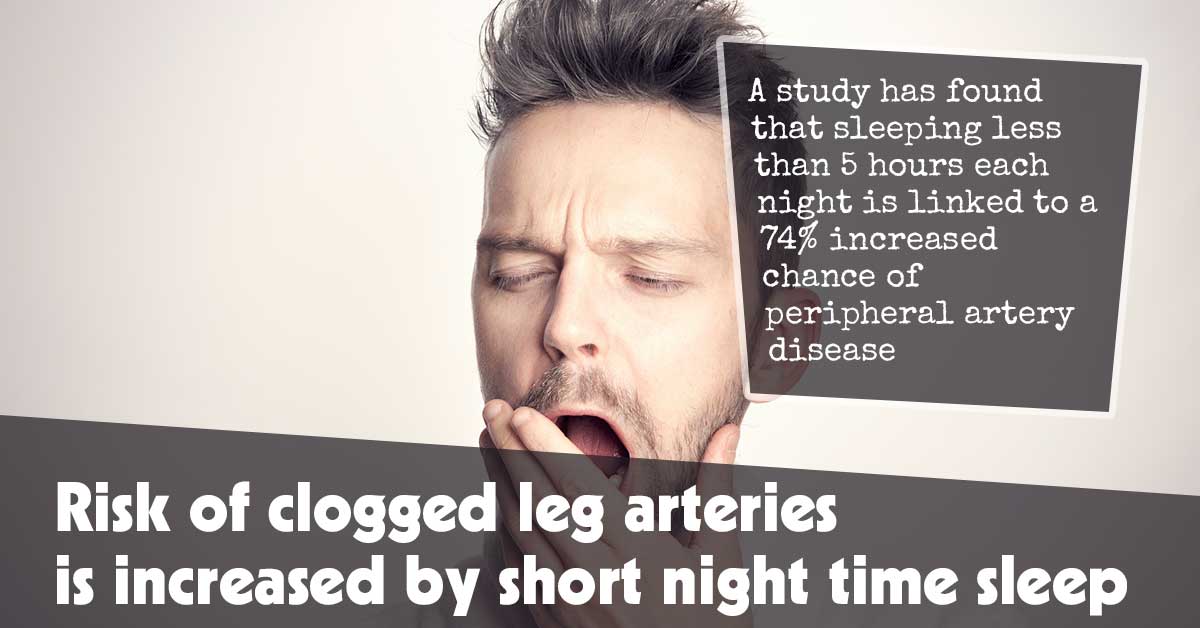A study has found that sleeping less than 5 hours each night is linked to a 74% increased chance of peripheral artery disease in comparison to sleeping 7 to 8 hours. The study indicates that sleeping for 7 to 8 hours each night is a good habit for reducing peripheral artery disease risk.1✅ JOURNAL REFERENCE
DOI: 10.1093/ehjopen/oead008
Over 200 million individuals worldwide have peripheral artery disease which is when leg arteries are clogged and blood flow is restricted and the risk of heart attack and stroke is increased.
Insufficient sleep at night and napping during the day have previously been linked to an increased coronary artery disease risk which is also a result of clogged arteries.
Sleeping issues are also among the most common complaints in individuals with peripheral artery disease. There are limited data on how sleep habits impact peripheral artery disease and vice versa, and the goal of this study was to explore this association.
The study included over 650,000 individuals and was carried out in 2 parts. The researchers 1st analyzed the relationships of sleep duration and napping in the daytime between peripheral artery disease risk.
In the 2nd part, the researchers made use of genetic data to carry out naturally randomized controlled studies, known as Mendelian randomization, to look at the causality of the relationships.
Observational analyses are limited by reverse causality, which means that if a relationship between sleep habits and peripheral artery disease is found, there can be no certainty if sleep habits led to peripheral artery disease or having peripheral artery disease led to the sleep habits. Mendelian randomization is a robust way of assessing causality and offers more accurate results.
Taken together, short sleep provided the strongest evidence, where the association with peripheral artery disease went both ways. An observational analysis of 53,416 individuals found that sleeping less than 5 hours each night was linked to almost double the risk of peripheral artery disease in comparison to sleeping 7 to 8 hours.
This result was supported by additional analyses in 156,582 and 452,028 individuals. Short sleep was linked to an increase in the risk of peripheral artery disease in the causal studies and peripheral artery disease was also linked to an increased chance of short sleep.
The results suggest that brief night-time sleep can increase the risk of peripheral artery disease and that having peripheral artery disease increases the risk of inadequate sleep.
With regards to long sleep, in an observational analysis of 53,416 individuals, sleeping 8 hours or more each night was linked to a 24% higher risk of peripheral artery disease in comparison to sleeping 7 to 8 hours.
This result was supported by 2 larger population analyses of 156,582 and 452,028 people. No causal associations were however found between long sleep and peripheral artery disease. Similar results were observed for napping, where individuals napping in the daytime had a 32% higher risk of peripheral artery disease in comparison to those who didn’t nap but no causal links were observed.
More studies are required on the associations between lengthy night-time sleep, napping in the daytime, and peripheral artery disease. Although the researchers found relationships in the observational studies, causality could not be confirmed.
More research is also required on how to interrupt the bidirectional association between short sleep and peripheral artery disease. Lifestyle changes that help individuals get more sleep, which include being physically active, could reduce peripheral artery disease risk. For individuals with peripheral artery disease, optimizing pain management could help them to have a good night’s sleep.



